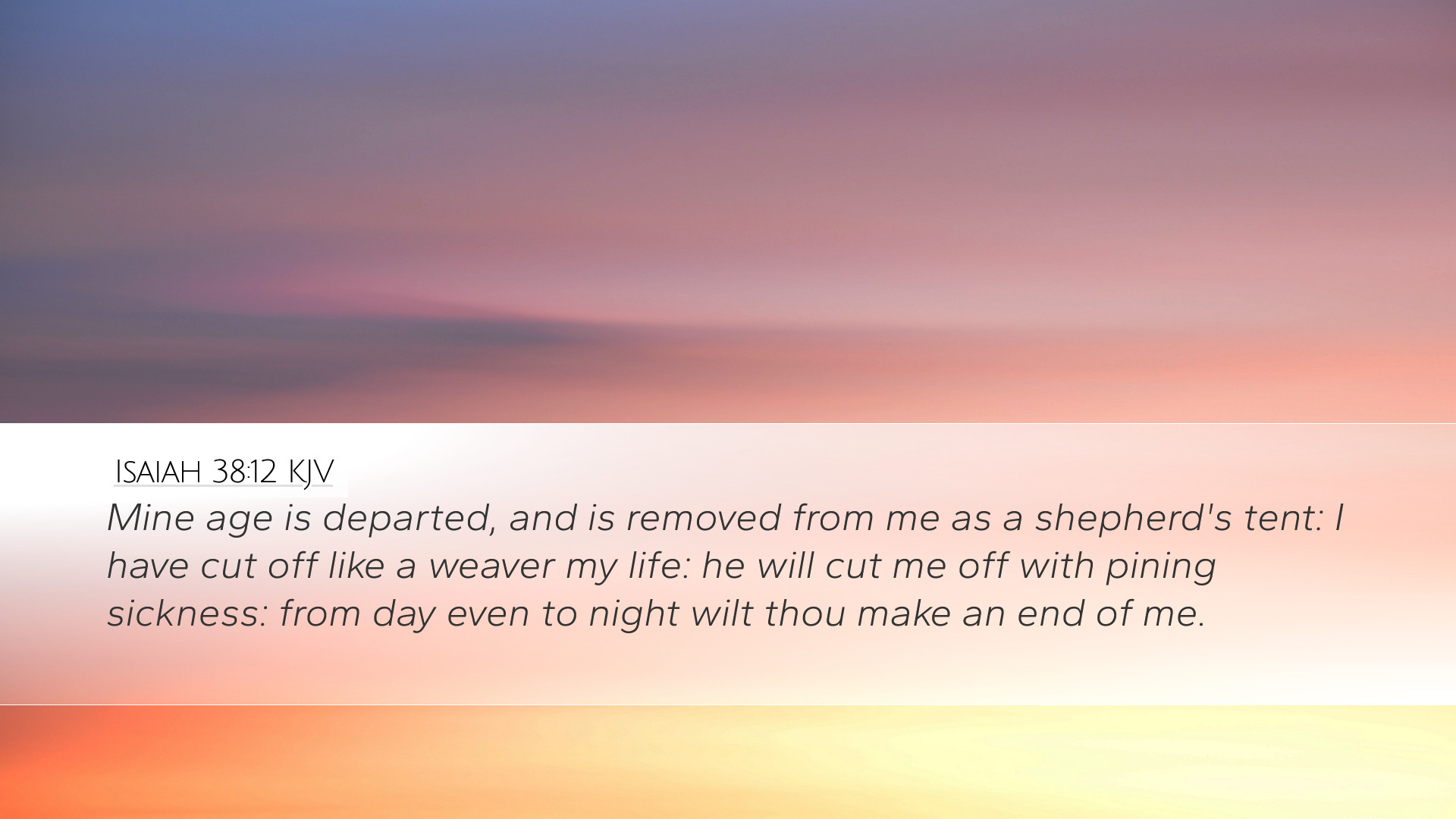Commentary on Isaiah 38:12
Verse: "Mine age is departed, and is removed from me as a shepherd's tent: I have cut off like a weaver my life: he will cut me off with pining sickness: from day even to night wilt thou make an end of me." (Isaiah 38:12, KJV)
Introduction
Isaiah 38:12 contains a poignant expression of the prophet's contemplation on life, mortality, and divine providence. This verse emerges from the narrative of King Hezekiah's illness and subsequent recovery, encapsulating profound theological themes and human emotions. The commentaries of Matthew Henry, Albert Barnes, and Adam Clarke provide a rich tapestry of insights into the meaning and implications of this verse, especially regarding the frailty of human existence and the mercy of God.
The Context of Hezekiah’s Illness
Hezekiah, the king of Judah, was faced with a life-threatening illness. Isaiah was sent by God to inform him that he would die. This moment brought Hezekiah to a deep reflection on his life and his relationship with Yahweh. The context of despair, hope, and eventual deliverance is critical to understanding the depth of his cry in verse 12.
Matthew Henry's Insights
Matthew Henry reflects on the transient nature of human life, likening it to a shepherd's tent that is easily taken down. He notes that the imagery conveys a sense of abruptness in the conclusion of life. Just as a tent is temporary, so is life on earth, and this comparison serves to remind believers of the fleeting nature of their time.
Albert Barnes's Perspective
Barnes emphasizes the sorrowful acknowledgment of mortality. He interprets the phrase "My age is departed" as a recognition of the finitude of life—a realization that resonates deeply with the human condition. Furthermore, he elaborates on the metaphor of cutting off like a weaver, indicating the sudden and unexpected nature of death. The weaver's work, which can be undone in an instant, mirrors the fragility of human existence.
Adam Clarke’s Commentary
In his commentary, Adam Clarke emphasizes the emotional weight carried in the expressions used by Hezekiah. Clarke highlights the earnest plea of the king, depicting a personal struggle with the inevitability of death. He notes that the "pining sickness" signifies not only physical deterioration but also the spiritual and emotional toil accompanying such a dire state. Life is, indeed, portrayed as a thread that the divine Weaver controls, reminding us of God's sovereignty over time and existence.
Key Themes and Reflections
- The Immediacy of Life's End: The verse encapsulates the suddenness with which life can be altered—Hezekiah was caught off guard by his impending death.
- The Nature of Human Existence: The similes used reflect a transitory life, which should lead believers to a deeper appreciation of every moment as a gift from God.
- Desperation and Dependency on God: Hezekiah’s utterances demonstrate a profound dependency on divine mercy in the face of looming mortality.
Pastoral Applications
This passage speaks volumes within a pastoral context, offering insights that can effectively minister to those facing illness or the reality of mortality.
- Encouragement in Trials: Pastors can use this verse to remind congregants that God is aware of their struggles and can provide hope and healing.
- Reflection on Life's Purpose: The imagery of life being like a tent prompts believers to consider what truly matters in their daily lives.
- Prayer for Healing: Hezekiah's prayer serves as a model for intercessory prayer and seeking God’s mercy in times of need.
Theological Implications
Isaiah 38:12 also carries significant theological implications regarding God's sovereignty and human frailty.
- God's Sovereignty: The verse reinforces the belief that God has the ultimate authority over life and death, underscoring an omniscient deity.
- The Understanding of Suffering: Hezekiah's plight evokes a deeper exploration of the purpose of suffering and the hope found in divine deliverance.
- The Impact of Prayer: The restoration that follows is a testament to the power of prayer and the relational aspect of God with His people.
Conclusion
Isaiah 38:12 serves as a powerful reminder of the fragile nature of human life and the mercy of God available in times of need. Through insights drawn from Matthew Henry, Albert Barnes, and Adam Clarke, we are presented with a multifaceted understanding of this poignant verse. It calls upon pastors, students, theologians, and scholars to reflect on the depth of their faith, the nature of life, and the God who weaves together the threads of our existence.


